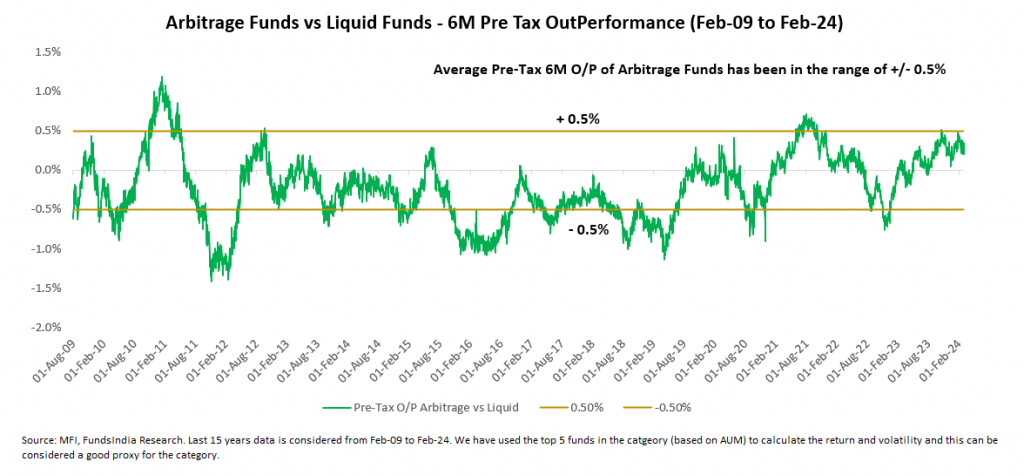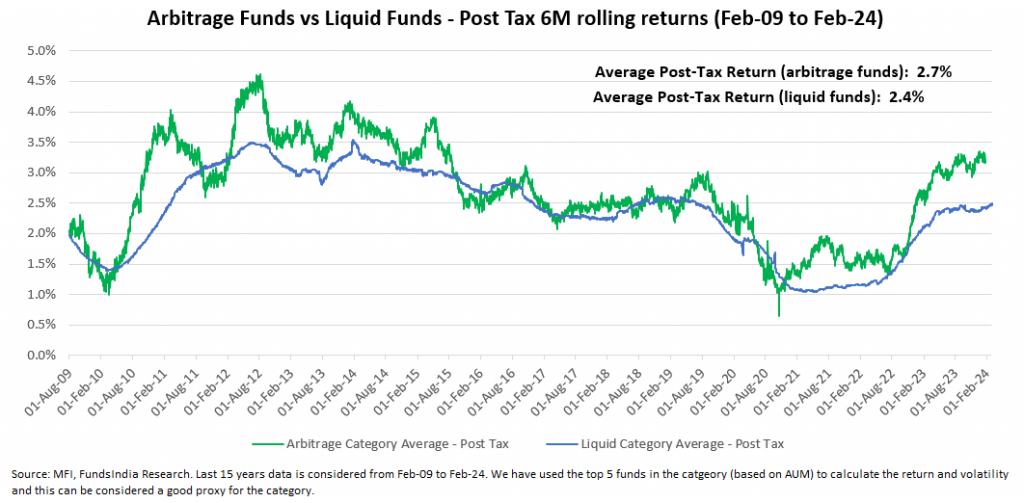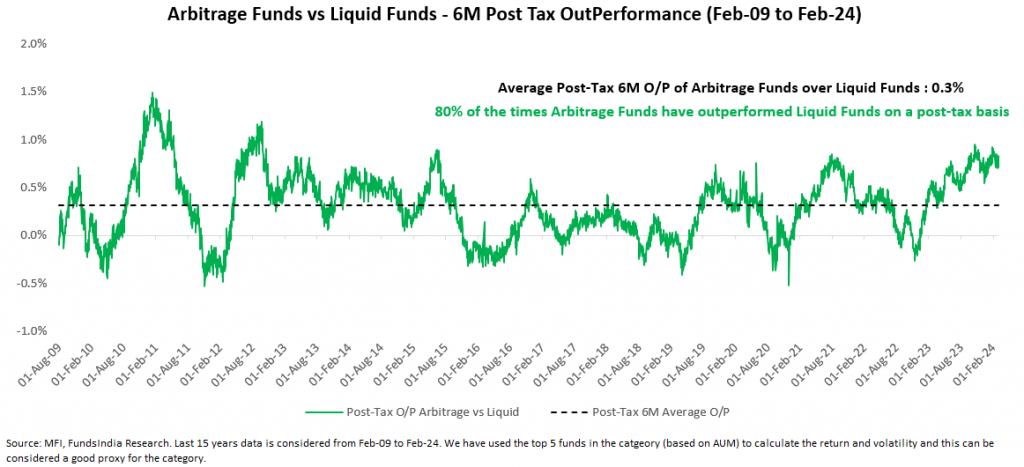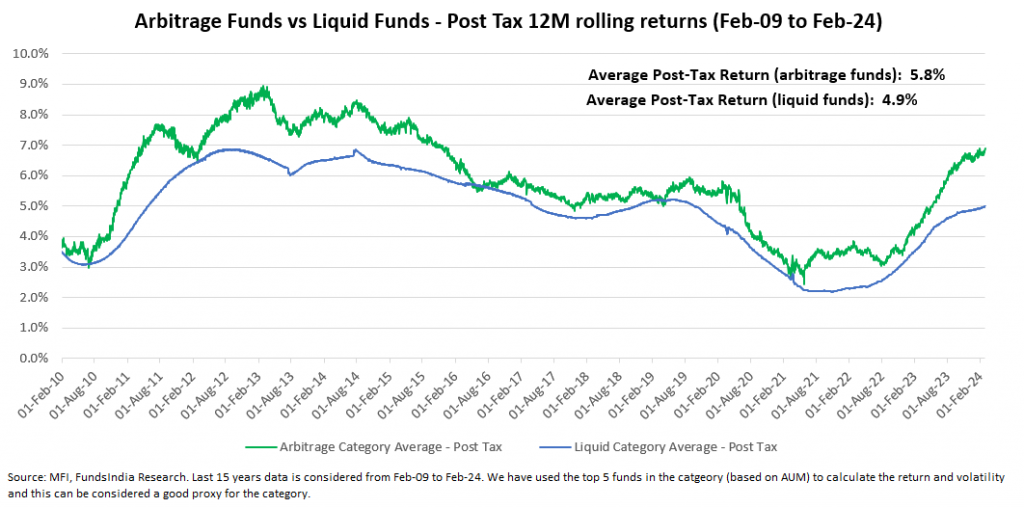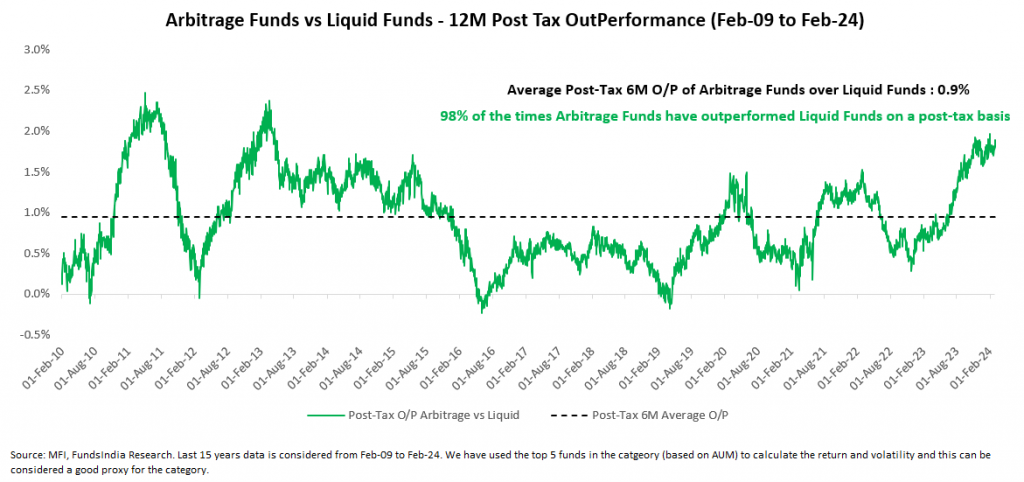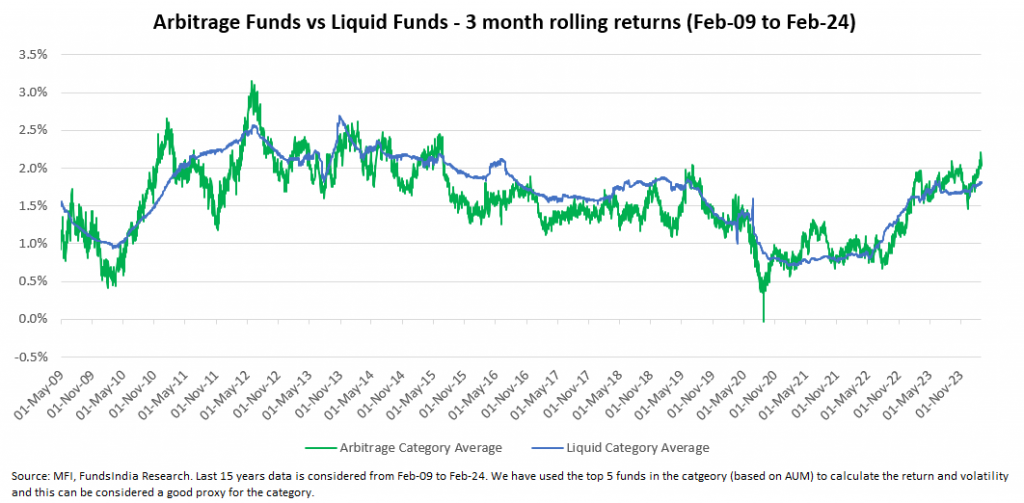What are Arbitrage Funds?
Arbitrage Funds are Debt Oriented Hybrid Funds which invest in a mix of Arbitrage and Debt/FDs. They usually have 65-75% of their portfolio in ‘Arbitrage’ investments and the remaining 25-30% in ‘Debt/FDs’.
Over a 6 month to 1 year period, arbitrage fund returns are typically comparable to liquid fund returns. But unlike liquid funds which are taxed according to your tax slab, arbitrage funds enjoy equity taxation as the funds maintain more than 65% exposure to arbitrage investments.
For any fund to qualify for equity taxation, the exposure to Indian equities must be above 65% of the portfolio. Arbitrage portion though the returns are similar to a debt liquid fund is considered as equity from the tax angle as it involves buying a stock in the cash market (that is the stock market) and selling it in the futures market.
How do they work?
Arbitrage Funds work on the arbitrage principle where they take advantage of pricing difference of a particular asset, between two or more markets. It captures risk free profit on the transaction.
One of the most commonly used strategy by arbitrage funds is the Cash Future Arbitrage. Under this strategy, arbitrage funds simultaneously buy stocks in the cash market and sell them in the futures at a slightly higher price thereby locking the spread (risk free profit) at initiation. At expiry, future price converge with actual stock price accordingly gain is realized.
Example:
What should be the return expectation from arbitrage funds?
Let us evaluate this by comparing the average returns (largest 5 funds) of Arbitrage Funds category vs Liquid Funds category over the last 15 years.
For 6 month time frames, Pre-tax returns from arbitrage funds are similar to liquid funds…
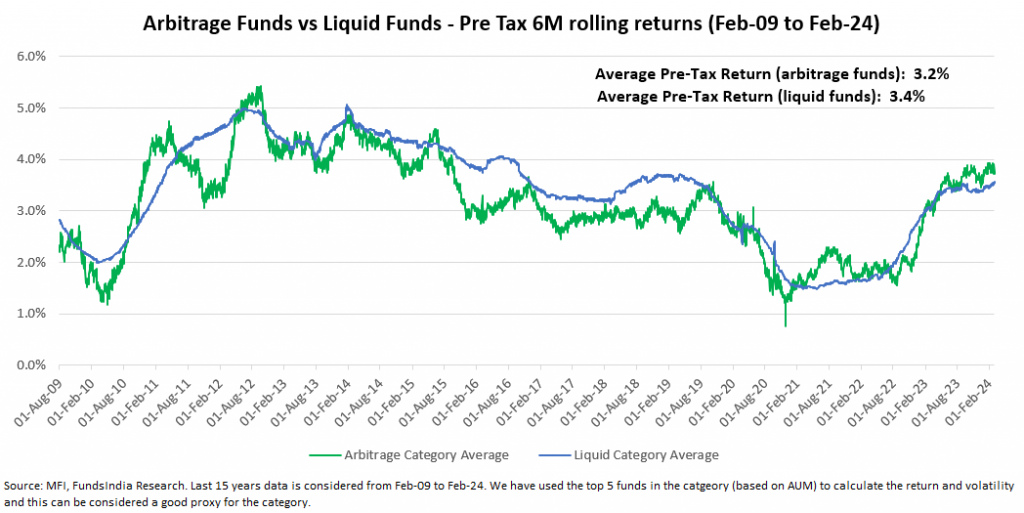
But Post-tax returns from arbitrage funds are generally better than liquid funds due to lower taxation…
Arbitrage funds unlike liquid funds enjoy equity taxation..
80% of the times Arbitrage Funds on a post-tax basis have outperformed Liquid Funds over 6 month time frames…
98% of the times Arbitrage Funds on a post-tax basis have outperformed Liquid Funds over 1 year frames – average outperformance of 0.9%!
Takeaway: Arbitrage funds are a tax efficient alternative and offer better post-tax returns compared to liquid funds over 6M-1Y time frames
How volatile are arbitrage funds compared to liquid funds?
We have evaluated volatility by observing the instances of daily or one-day negative returns over the last 15 years.
Daily returns for arbitrage funds were negative 33% of the times vs 0.4% of the times for liquid funds…
This improves once you increase the time frames – Monthly returns for arbitrage funds were negative only 0.6% of the times vs 0% of the times for liquid funds…
No instances of negative returns for arbitrage funds on a 3 month basis…
While on a 3 month basis there are no instances of negative returns in arbitrage funds, to be on the conservative side we would suggest a minimum time frame of atleast 6 months. If you can hold and extend your time frame by more than 1 year then you also get the benefit of long-term capital gains tax.
Takeaway: Arbitrage funds in the short run, are slightly more volatile than liquid fund – invest with a time frame of atleast 6 months to 1 Year
Which are the scenarios under which arbitrage fund returns will come under pressure?
Arbitrage fund returns largely depend on the spreads between the stock and the futures market. The spreads can shrink (or worse still, turn negative) under the following situations:
- Bearish or Rangebound markets – In bearish or range-bound markets, arbitrage opportunities dry up and an arbitrage fund may have to stay invested in debt or hold cash. Also, when the market sentiment is bearish, futures may trade at a discount (and not a premium) to the cash market implying negative spreads.
- Growing AUMs of arbitrage funds – As the AUMs of arbitrage funds grow, there is more money chasing arbitrage opportunities and the spreads tend to go down.
- Falling interest rates – theoretically, future price is spot price + risk-free rate. Hence, a fall in interest rates, implies lower futures price of a stock and hence lower spreads and reduced arbitrage opportunity.
- Lower borrowing and currency hedging costs for FIIs – As these costs come down, there is increased FII participation in Indian equity arbitrage trades. This brings down the overall arbitrage spreads in the market.
Are Arbitrage Funds right for you?
Arbitrage funds can be considered if
- You have a time frame of >6 months
- You are looking for better post tax returns than liquid funds
- You are okay with slightly higher temporary volatility (vs liquid funds)
Summing it up
- Arbitrage Funds are debt oriented hybrid funds which invest in a mix of arbitrage and debt. They usually have 65-75% in arbitrage with debt and FD’s accounting for the remaining 25-30%.
- Arbitrage Funds generate returns by engaging in arbitrage opportunities and taking advantage of the spread or the differential in the price of a stock in the spot market versus its price in the futures market.
- Arbitrage funds are a tax efficient alternative (enjoy equity taxation) and offer better post-tax returns compared to liquid funds over 6M-1Y time frames
- Invest with a minimum time frame of atleast 6 months as they have slightly higher volatility compared to liquid funds over shorter time frames. By extending your time frame to more than 1 year you can also enjoy the benefit of long-term capital gains tax (No tax for gains less than Rs 1 lakh and 10% tax for gains more than 1 lakh)
Other articles you may like





